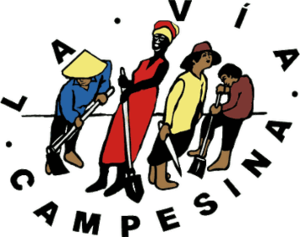La Via Campesina: Difference between revisions
(Created page with "thumb Established in 1993, La Via Campesina, meaning The Peasant's Way, is a network of an estimated 200 million small farmers in 81 count...") |
No edit summary |
||
| Line 1: | Line 1: | ||
[[File:La Vía Campesina logo.png|thumb]] | [[File:La Vía Campesina logo.png|thumb]] | ||
Established in 1993, La Via Campesina, meaning The Peasant's Way, is a network of an estimated 200 million small farmers in 81 countries. | Established in 1993, La Via Campesina, meaning The Peasant's Way, is a network of an estimated 200 million small farmers in 81 countries. La Via Campesina coined the term "food sovereignty" which they define as "the right of peoples to healthy | ||
and culturally appropriate food produced through ecologically sound | |||
and sustainable methods, and their right to define their own food and | |||
agriculture systems."<ref>Laura Gutiérrez Escobar, "Food Sovereignty" in ''Pluriverse: A Post-Development Dictionary'', ed. Alberto Acosta, Ariel Salleh, Arturo Escobar, Ashish Kothari and Federico DeMari (New Dehli: Tulika Books, 2019), 185-188.</ref> La Via Campesina strongly opposes capitalism and patriarchy.<ref>"#8M2021 Against the Virus of Patriarchy and Capitalism, the Vaccine of Feminism and Solidarity!," 8 March 2021, https://viacampesina.org/en/8m2021-against-the-virus-of-patriarchy-and-capitalism-the-vaccine-of-feminism-and-solidarity/.</ref> | |||
The network runs about 70 schools and training processes<ref>https://viacampesina.org/en/international-peasants-voice/.</ref> and has organized and participated in many mobilizations. One report summarizes that La Via Campesina members "have walked together in the streets of Geneva, Paris, Seattle, Québec City, Quito, Rome, Johannesburg, Porto Alegre, Cancún, Hong Kong, | |||
Copenhagen, and Durban, among other major cities. Whenever and wherever | |||
international institutions like the World Trade Organization (WTO) and the Food and | |||
Agriculture Organization (FAO) meet to discuss agricultural and food issues, La Via | |||
Campesina is there."<ref>Annette Aurélie Desmarais and Paul Nicholson, "La Via Campesina: An Historical and Political | |||
Analysis," https://viacampesina.org/en/wp-content/uploads/sites/2/2013/05/EN-10.pdf.</ref> Member organizations include Brazil's [[Landless Workers' Movement]] which has seized land where 150,000 families currently reside. | |||
LVC has a decentralized structure, with the vast majority of decision-making and organizing taking place at the local and national levels. LVC's organizations unite into 9 regions.<ref>https://www.jpic-jp.org/t/3-la-via-campesina-international-peasants-mouvement.</ref> Each region has a face-to-face decision-making assembly that nominates 3 delegates to meet at the International Conference every 3 to 4 years. That conference forms the Internal Coordinating Commission with 2 representatives, one man and one woman, form each region.<ref>Michael Mesner, "Transnational Participatory Democracy in Action: The Case of La Via Campesina," ''Journal of Social Philosophy 39'', no. 1 (2008): 20-41.</ref> | |||
The movement's green anti-capitalism, direct action-oriented strategy, and decentralized organizational structure have much in common with the horizontal unionist strategy of [[Green Syndicalism]]. | |||
<references/> | <references/> | ||
Revision as of 06:11, 11 April 2022
Established in 1993, La Via Campesina, meaning The Peasant's Way, is a network of an estimated 200 million small farmers in 81 countries. La Via Campesina coined the term "food sovereignty" which they define as "the right of peoples to healthy and culturally appropriate food produced through ecologically sound and sustainable methods, and their right to define their own food and agriculture systems."[1] La Via Campesina strongly opposes capitalism and patriarchy.[2]
The network runs about 70 schools and training processes[3] and has organized and participated in many mobilizations. One report summarizes that La Via Campesina members "have walked together in the streets of Geneva, Paris, Seattle, Québec City, Quito, Rome, Johannesburg, Porto Alegre, Cancún, Hong Kong, Copenhagen, and Durban, among other major cities. Whenever and wherever international institutions like the World Trade Organization (WTO) and the Food and Agriculture Organization (FAO) meet to discuss agricultural and food issues, La Via Campesina is there."[4] Member organizations include Brazil's Landless Workers' Movement which has seized land where 150,000 families currently reside.
LVC has a decentralized structure, with the vast majority of decision-making and organizing taking place at the local and national levels. LVC's organizations unite into 9 regions.[5] Each region has a face-to-face decision-making assembly that nominates 3 delegates to meet at the International Conference every 3 to 4 years. That conference forms the Internal Coordinating Commission with 2 representatives, one man and one woman, form each region.[6]
The movement's green anti-capitalism, direct action-oriented strategy, and decentralized organizational structure have much in common with the horizontal unionist strategy of Green Syndicalism.
- ↑ Laura Gutiérrez Escobar, "Food Sovereignty" in Pluriverse: A Post-Development Dictionary, ed. Alberto Acosta, Ariel Salleh, Arturo Escobar, Ashish Kothari and Federico DeMari (New Dehli: Tulika Books, 2019), 185-188.
- ↑ "#8M2021 Against the Virus of Patriarchy and Capitalism, the Vaccine of Feminism and Solidarity!," 8 March 2021, https://viacampesina.org/en/8m2021-against-the-virus-of-patriarchy-and-capitalism-the-vaccine-of-feminism-and-solidarity/.
- ↑ https://viacampesina.org/en/international-peasants-voice/.
- ↑ Annette Aurélie Desmarais and Paul Nicholson, "La Via Campesina: An Historical and Political Analysis," https://viacampesina.org/en/wp-content/uploads/sites/2/2013/05/EN-10.pdf.
- ↑ https://www.jpic-jp.org/t/3-la-via-campesina-international-peasants-mouvement.
- ↑ Michael Mesner, "Transnational Participatory Democracy in Action: The Case of La Via Campesina," Journal of Social Philosophy 39, no. 1 (2008): 20-41.
